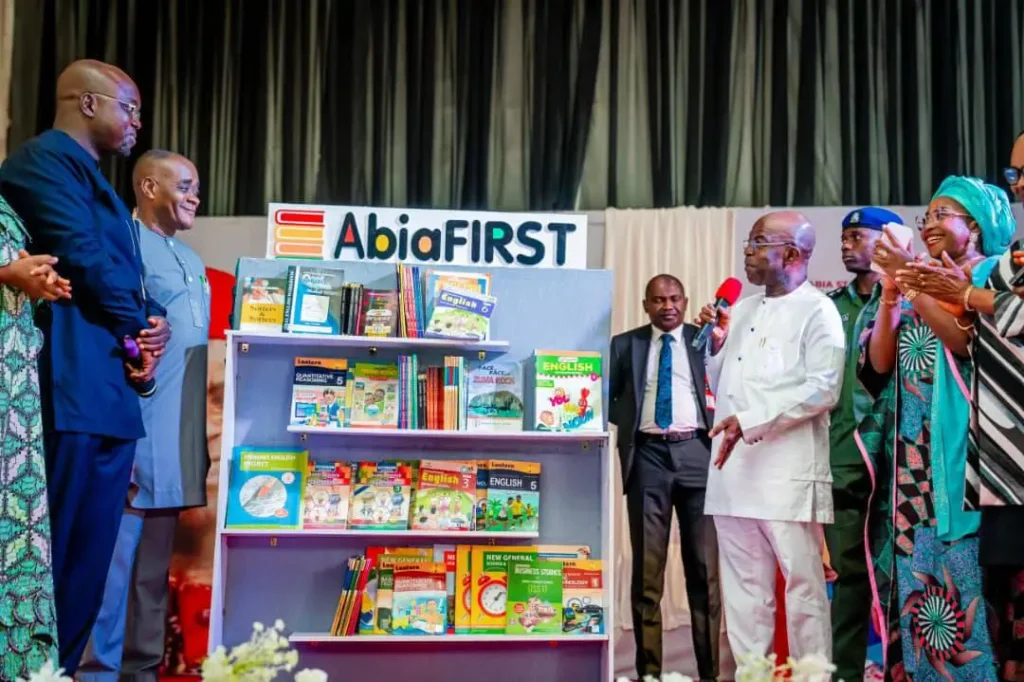Gov. Alex Otti of Abia has launched the AbiaFIRST Education Transformation Programme designed to drive sustainable transformation in the education sector for enhanced socio-economic development in the state.
Speaking at the event in Umuahia, on Wednesday, Otti said the initiative aimed at revitalising the education sector through strategic investments in infrastructure, teacher development, and curriculum enhancement.
The governor said that education remains central to his administration’s development agenda.
He also said that the programme reflected the government’s commitment to building a knowledge-driven society that prioritises academic excellence.
“Education is no longer optional, it is a necessity for any society that seeks progress.
“It opens doors to endless opportunities, liberates people from ignorance and superstition, and lays the foundation for future generations,” Otti said.
He further said that the initiative would focus on upgrading school infrastructure to create conducive learning environments and training and retraining teachers to align with global best practices in education.
Otti also said that the programme would cover the recruitment of qualified educators to meet rising student enrollment, following the introduction of free and compulsory basic education.
He said that the initiative would be used to reform school curriculum to integrate emerging knowledge and essential skills for the modern world.
He opined that another key area that would address the programme included the enhancement of school security to ensure a safe and secure learning atmosphere.
He said that the gaps that developed in state’s education system stemmed from the failure of past administrations to give priority attention to the sector.
“We are going to take the lead by investing in infrastructure, hiring the best minds to teach our children, and ensuring competitive salaries for teachers.
“Our goal is to build a system that fosters diligence, innovation, and fair competition,” Otti said.
He assured residents that no effort would be spared in preparing Abia youth for the challenges and opportunities of a rapidly evolving world.
In a speech, the Commissioner for Basic and Secondary Education, Mr Goodluck Ubochi, said that the programme had been designed to transform and reform the school system in Abia.
Ubochi said that the programme would focus on improving individual schools and a complete institutional reform that would transform education in Abia, through innovative solutions.
He said that the government had evolved plans to introduce innovative solutions, which included digital learning platforms, wholesome curriculum framework, teacher professional development, technical and vocational education.
The commissioner also said that government planned to create a monitoring and evaluation system and Science, Technical Engineering, Arts and Mathematics as other innovative solutions toward transforming the education sector.
Ubochi said that the programme aligned perfectly with the agenda of the present administration to rebuild Abia.
In separate goodwill messages, the National Project Officer of UNESCO, Mr Adeyemi Oladeji, a World Bank Senior Education Specialist, Dr Tunde Adekola, and a representative of the British Council Country Office, Abuja, Mr Daniel Fwanshishak, commended government’s efforts to revitalise the education sector in Abia.
They expressed their readiness to support and partner with the government through capacity building initiatives to enhance education development.
In a remark, the Team Lead of Education Reform and Innovation Team, Mrs Abolaji Osimen, said that the initiative would foster digital proficiency among students and collaboratively address the challenges facing the education sector.
Osimen said that recent statistics indicate that 80 per cent of the 40 million students in Nigeria attend public schools.
“We are here to partner with Abia and our transformation strategy hinges on improving learning outcomes, producing future-ready workforce, learning environment transformation, teacher excellence and strategic investments.
“We must either address our learning crises now or risk creating the future with an under-skilled population.
“The choices that we make will determine our emergence as a dynamic economy with a highly skilled workforce to address the challenge,” Osimen said.


